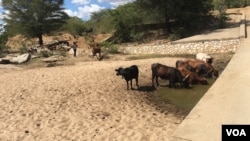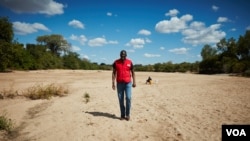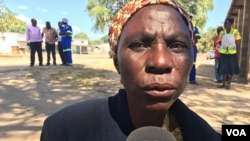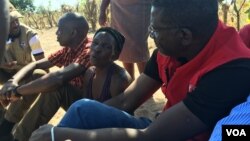The land is dry, as are the rivers in southern Africa, where crops are scarce and 28 million people are hungry. The children show more life than the adults during this El Nino-induced drought in Mudzi district about 250 kilometers east of Harare, one of the hardest hit areas in Zimbabwe.
Elhadj As Sy, secretary-general of the International Federation of Red Cross and Red Crescent Societies, went to southern Africa to assess the food insecurity situation.
"What is touching is proud fathers and mothers, like me and you, who would care for themselves and their children now depending on either cash transfer programs or food handouts we are giving to them, and see their dignity eroded,” Sy said of his visits to Malawi and Zimbabwe, the countries most devastated by the drought. “That is very touching. What is touching is to see children go to bed hungry. Children that may not go to school and a mother that has to listen to children crying and having no food to give to them. That is profoundly, profoundly touching and that is totally unacceptable.
“We cannot describe enough how dire the situation is and that is not the most important thing. What is important is what is it that you are going to do about it? And that is what we are concentrating on right now."
On Tuesday, Sy is expected to launch an appeal for $150 million to avert hunger in southern Africa.
Sixty-year-old Mabel Nyamono of Mudzi is looking forward to an increase in funding in Zimbabwe.
“Here, there is real hunger,” Nyamono said. “Most of the days, kids go to school on an empty stomach and may go for three or four days without a decent meal.”
Families get worried, she adds, when the Red Cross takes time before giving cash handouts. “The government might be trying,” she said, “but it is not reaching everyone [who needs assistance].”
In Mudzi district, the Zimbabwe Red Cross gives cash handouts of $40 a month to 1,222 families.
For many other families, no assistance is given. Such is the case of 61-year-old Virgilance Tsabora, who is not in the Red Cross or U.N. assistance programs. Tsabora looks after her 89-year-old mother, who cannot walk, talk, see or hear properly. Neither has a source of income.
Tsabora says she depends on fellow villagers for help, but hopes the Red Cross's Sy can ease their struggle.
It is the dire stories of people like Tsabora and her mother that need to be told at the World Humanitarian Summit next month in Istanbul, according to Sy. At that meeting, U.N. chief Ban Ki-Moon and international aid groups will work to create a plan that builds resilience in countries in southern Africa and around the globe that are facing catastrophe.







